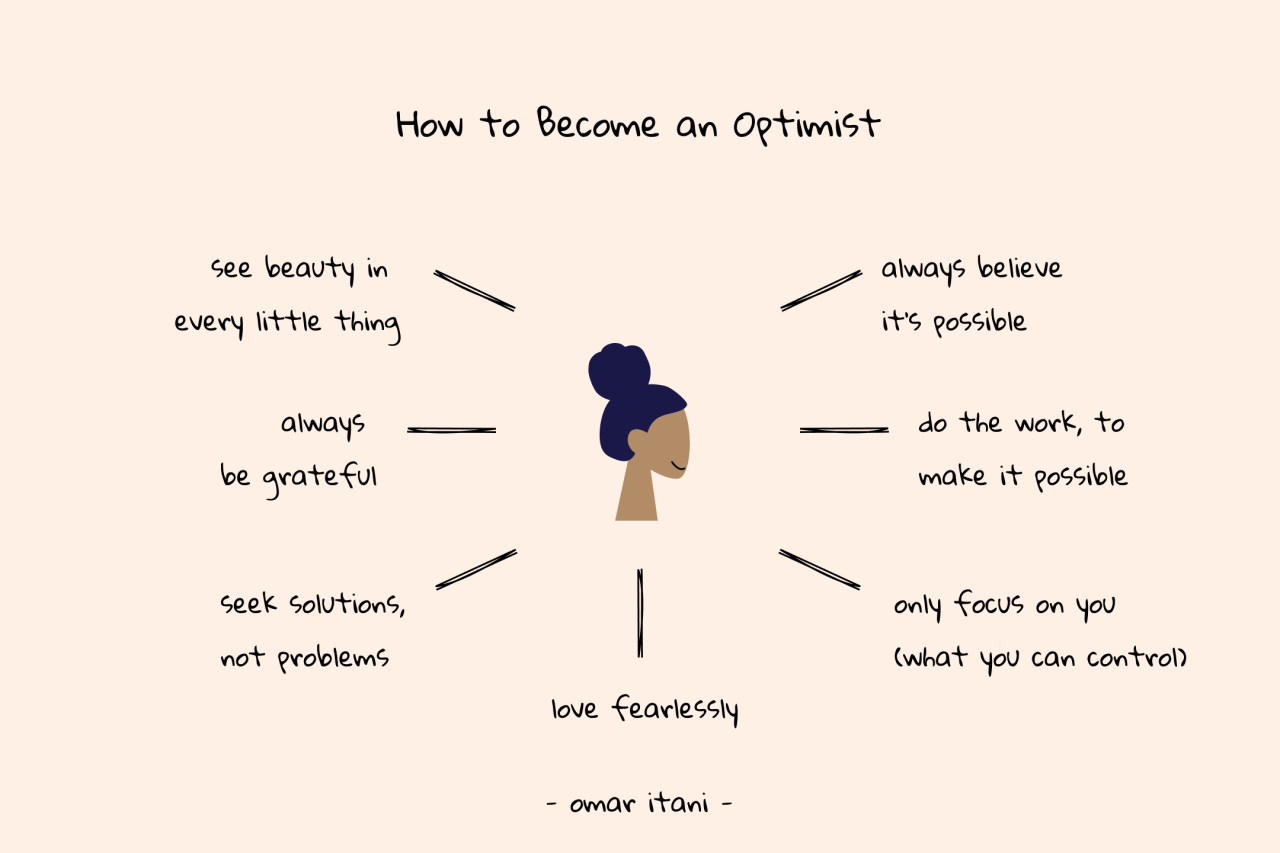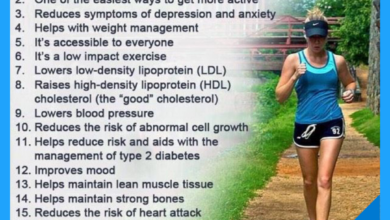
Can Faking Optimism Improve Your Health?
Could being an optimist or faking it improve your health – Can being an optimist, or even faking it, truly improve your health? This question has sparked debate among researchers and health enthusiasts alike. While genuine optimism is often linked to better health outcomes, some argue that even a “fake it till you make it” approach can yield positive results.
This blog delves into the science behind optimism and its impact on our well-being, exploring both the potential benefits and the potential pitfalls of cultivating a positive mindset.
We’ll examine the psychological and physiological mechanisms that underpin optimism’s influence on our bodies and minds. We’ll also explore various techniques for cultivating optimism, from mindfulness practices to developing a growth mindset, and discuss the importance of social support and gratitude in fostering a more positive outlook.
The Power of Optimism

Optimism, the belief that good things will happen, is more than just a positive attitude. It’s a powerful force that can profoundly impact our physical and mental health. Research has shown that optimists tend to live longer, healthier lives, while pessimism is linked to increased risk of chronic diseases and premature death.
The Psychological Benefits of Optimism
A positive outlook can have a remarkable impact on our mental well-being. Optimistic individuals tend to experience less stress, anxiety, and depression. They are better equipped to cope with challenges and setbacks, viewing them as opportunities for growth rather than insurmountable obstacles.
This resilience allows them to maintain a sense of control and agency, leading to greater emotional stability.
The Physiological Benefits of Optimism
Optimism’s benefits extend beyond the psychological realm. It has a tangible impact on our physiological health. Studies have shown that optimists have stronger immune systems, with higher levels of antibodies and natural killer cells that fight off infections. Their bodies are also better equipped to manage stress, reducing the risk of cardiovascular disease and other chronic illnesses.
How Optimism Influences Stress Levels
Optimism helps us reframe stressful situations, viewing them as temporary challenges rather than permanent threats. This allows us to maintain a sense of control and cope with stress more effectively. Optimists are also more likely to engage in proactive coping strategies, such as seeking support from others or finding solutions to problems, further reducing their stress levels.
I’ve always wondered if being optimistic, even if you have to fake it, could actually boost your health. I mean, if you can convince yourself that things are going to be okay, maybe your body will follow suit. And that’s where the concept of recovery days comes in.
It’s a great way to prioritize your well-being and give your body a chance to recharge. Check out 5 great things about recovery days for some inspiration. Taking those days off might be the key to unlocking a more positive outlook and ultimately, a healthier you.
The Link Between Optimism and Immune Function
Optimism can influence the immune system by reducing stress hormones like cortisol, which can suppress immune function. Research suggests that optimists may have stronger immune responses, with higher levels of antibodies and natural killer cells, making them less susceptible to infections.
Studies Demonstrating the Link Between Optimism and Improved Health Outcomes
Numerous studies have demonstrated the positive link between optimism and improved health outcomes. For instance, a study published in the journal “Psychosomatic Medicine” found that optimists were less likely to develop heart disease, even after accounting for other risk factors.
Another study, published in the “Journal of the American Medical Association,” found that optimism was associated with a reduced risk of mortality from all causes.
The Role of Mindfulness: Could Being An Optimist Or Faking It Improve Your Health

Mindfulness, the practice of focusing on the present moment without judgment, plays a vital role in cultivating genuine optimism. It empowers individuals to break free from negative thought patterns and cultivate a more positive outlook on life.
Mindfulness and Genuine Optimism
Mindfulness cultivates genuine optimism by helping individuals shift their attention away from dwelling on past regrets or worrying about future uncertainties. By focusing on the present moment, they can appreciate the good things in their lives and develop a more realistic and balanced perspective.
I’ve always wondered if being optimistic, even if it’s a little bit of an act, could actually boost your health. Maybe it’s like how endurance athletes need to fuel their bodies with carbs during workouts, how endurance athletes should carb up during workouts , to keep their energy levels high.
Perhaps a positive mindset is like a mental fuel that keeps us going through tough times, making us more resilient and healthy in the long run.
Mindfulness practices help individuals recognize their thoughts and emotions without judgment, allowing them to observe their patterns and challenge negative thinking.
I’ve been thinking a lot lately about how optimism, even if it’s a bit “faked,” could actually make a difference in our health. Maybe it’s because I read this article about how walking can help you live longer even if you’ve never exercised before , and it got me thinking about the power of small, positive changes.
If even a simple activity like walking can have such a huge impact, maybe a little optimism can too. After all, a positive outlook might just give us the motivation to get up and get moving in the first place.
Identifying and Challenging Negative Thought Patterns
Mindfulness allows individuals to become more aware of their thoughts and emotions. This heightened awareness helps them identify negative thought patterns, such as catastrophizing, overgeneralizing, and personalizing. By observing these patterns without judgment, individuals can begin to challenge them and develop more realistic and positive interpretations of events.
Mindfulness Techniques for a Positive Outlook
There are various mindfulness techniques that can be incorporated into daily life to promote a more positive outlook.
- Mindful Breathing:Taking deep, conscious breaths can help calm the mind and reduce stress, creating a more peaceful and positive mental state.
- Body Scan Meditation:Focusing on different parts of the body and noticing any sensations can help individuals become more aware of their physical state and develop a greater sense of presence.
- Mindful Walking:Paying attention to the sensations of walking, such as the feeling of the ground beneath your feet or the movement of your arms, can bring a sense of grounding and awareness to the present moment.
- Mindful Eating:Focusing on the taste, texture, and smell of food can enhance the experience of eating and promote a sense of gratitude for the nourishment it provides.
The Impact of Gratitude

Gratitude, the appreciation for the good things in our lives, has emerged as a powerful force for enhancing optimism and improving overall well-being. Cultivating gratitude can shift our focus from what we lack to what we have, fostering a more positive outlook and promoting resilience in the face of challenges.
The Benefits of Gratitude on Mental Health
Gratitude has a profound impact on our mental health, promoting positive emotions, reducing stress, and enhancing our sense of satisfaction.
- Reduced Anxiety and Depression:Studies have shown that practicing gratitude can significantly reduce symptoms of anxiety and depression. By focusing on the positive aspects of life, individuals can lessen the impact of negative thoughts and feelings, leading to improved mood and emotional well-being.
For instance, a study published in the Journal of Happiness Studies found that participants who kept gratitude journals reported lower levels of depression and anxiety.
- Increased Happiness and Life Satisfaction:Gratitude is strongly linked to increased happiness and overall life satisfaction. When we focus on the good things in our lives, we experience a sense of contentment and appreciation that contributes to our overall well-being. Research has consistently shown that individuals who practice gratitude report higher levels of happiness and satisfaction with their lives.
- Improved Sleep Quality:Gratitude can also improve sleep quality. By focusing on positive experiences before bed, individuals can calm their minds and reduce stress, leading to more restful sleep. Studies have shown that gratitude interventions can lead to improvements in sleep duration and quality.
The Benefits of Gratitude on Physical Health
Beyond its mental health benefits, gratitude also positively impacts our physical well-being.
- Enhanced Immune Function:Gratitude has been linked to a stronger immune system. By reducing stress and promoting positive emotions, gratitude can help regulate the body’s immune response, making us less susceptible to illness. Research suggests that individuals who practice gratitude may have lower levels of inflammatory markers, which are associated with various health problems.
- Improved Cardiovascular Health:Gratitude can also improve cardiovascular health. By reducing stress, gratitude can lower blood pressure and heart rate, contributing to a healthier cardiovascular system. Studies have shown that individuals who practice gratitude have lower resting heart rates and blood pressure.
- Increased Resilience:Gratitude can enhance our resilience to adversity. When we focus on the positive aspects of our lives, we are better equipped to cope with challenges and setbacks. This resilience can lead to greater emotional well-being and improved overall health.
The Benefits of Gratitude on Social Relationships
Gratitude plays a crucial role in fostering healthy and fulfilling relationships.
- Stronger Social Bonds:Expressing gratitude to others strengthens social bonds and promotes a sense of connection. By acknowledging and appreciating the contributions of others, we build trust and foster a more positive social environment. Research suggests that individuals who express gratitude are more likely to have strong social support networks.
- Improved Communication:Gratitude can also improve communication within relationships. When we express gratitude, we create a more positive and appreciative atmosphere, making it easier to communicate openly and honestly.
- Increased Empathy and Compassion:Gratitude can enhance empathy and compassion. By focusing on the good things in our lives, we are more likely to recognize the needs and experiences of others, leading to greater empathy and compassion.
Examples of Gratitude Practices, Could being an optimist or faking it improve your health
Incorporating gratitude practices into daily life can significantly enhance our well-being. Here are some examples:
- Gratitude Journal:Keeping a gratitude journal is a simple and effective way to cultivate gratitude. Each day, write down a few things you are grateful for, no matter how small. This practice helps you focus on the positive aspects of your life and develop a more appreciative mindset.
- Gratitude Meditation:Gratitude meditation involves focusing on feelings of gratitude and appreciation. You can practice gratitude meditation by simply taking a few minutes each day to reflect on the things you are grateful for.
- Expressing Gratitude to Others:Take the time to express your gratitude to the people in your life. A simple “thank you” can go a long way in strengthening relationships and fostering a sense of appreciation.
- Gratitude Walks:Go for a walk and pay attention to the things you are grateful for in your surroundings. Notice the beauty of nature, the kindness of strangers, or the simple pleasures of life.
Closing Summary
Ultimately, the journey to a more optimistic outlook is a personal one. While there’s no one-size-fits-all approach, understanding the science behind optimism can empower us to make informed choices about our mental and physical well-being. Whether you choose to embrace genuine optimism or explore the benefits of faking it, the pursuit of a positive mindset can lead to a healthier, happier, and more fulfilling life.






